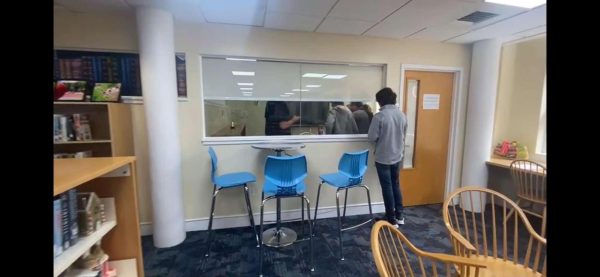Students and Faculty Adjust to New SchoolPass Attendance System
Android tablets now hang by the door of each classroom.
As Ransom Everglades students filed into classrooms on their first day of school, they encountered an unfamiliar development. Sleek Android tablets, encapsulated by white 3-D printed cases, hung by the doors.
The tablets are part of the SchoolPass system, a service RE began using during the coronavirus pandemic. According to their website, the software consolidates “student safety, physical attendance, dismissal, and parent engagement into one connected & patented platform.”
As Chief Technology Officer Mrs. Linda Lawrence explained, “SchoolPass was evaluated for its effectiveness when the school operated during COVID; it provided readily-available feedback on student wellness, allowed parents to communicate about student absences, early dismissals, announced pick-ups when parents did not have the opportunity to walk on campus, and maintained records on limited visitors and vendors actions on campus. During that time, the Technology Service Department and campus leaders were able to see the benefits of having an all-school campus movement/management system that integrated with our Blackbaud student information system.”
Before this year, students only engaged with SchoolPass when completing their daily COVID health screening or signing in and out from school. Now, it has taken on a more central role in RE life.
Under the new attendance plan, students must scan into every class using their school IDs. Whenever they leave the classroom during the period, they have to scan out and note the location they are leaving to. Lawrence added that “This allows the division attendance manager (Mrs. McAuley-Jugo) to have validation for excusing a tardy or an absence. It also allows the attendance manager to review a questionable class absence in real-time in order to determine if a student, and their safety, can be determined.”
The software, according to RE’s leadership team, has the potential to solve issues the school has grappled with in the past. By replacing the school’s previous manual attendance system with one that shifts responsibility onto the students, SchoolPass can save precious instruction time that would otherwise be wasted taking attendance.
The new system also promotes safety on campus, according to Mr. Robert DePriest, RE’s Director of Security. “If we ever have a situation on campus where we have to lock down or evacuate, we have to make sure that every kid is accounted for,” he explained.
In the case of an emergency, security personnel need to know who is on campus and who isn’t so that they know whom to look for. Security personnel can see if students are in their classrooms, at the nurse, or taking a bathroom break and can use that information to respond accordingly in crises. In the event of a fire on campus, security can use SchoolPass to see which students are unaccounted for through the system. Teachers can mark the students in their advisory as “safe” through their cell phones at their designated meeting points, and authorities can search for those who are missing.
Nevertheless, the new attendance system has met some pushback from students. Mikey Zoi ’24 expressed his dissatisfaction with the new program, regarding it as “redundant and excessive.” Zoi argued that attendance should be the teacher’s responsibility, and, in many cases, teachers still take attendance or have to manually override the system because it is not working properly.
Faculty members seem to have accepted the new system with cautious optimism. Mrs. Abigail Berler, a history teacher at RE, praised the system for freeing up valuable time for instruction. According to her, the idea of not having to “go into a screen [and] take attendance” every morning is “really helpful” in that it lifts a burden from teachers and places responsibility on the students themselves.
“The problem,” she noted, “is when the technology fails.” The early months of the system’s implementation have involved frequent technical issues, such as slow performance on the tablets, tablets not charging, and the system not registering student IDs properly. When these malfunctions happen, teachers have to use SchoolPass’s manual attendance website, a user interface filled with drop-down lists, tabs, and menus that, according to some teachers, takes more time to navigate than the previous MyCompass-based system did.
“More importantly,” Mrs. Berler asserted, “[the system] isn’t really working for fire drills.” Teachers have had difficulty accessing the software on their phones to mark students as safe, which is one of the system’s most critical intended functions.
However, Lawrence pointed out that “This approach to attendance is in its infancy yet shows growing promise daily. … Every day we are making this system more robust by improving electrical outlet feeds, cable stabilization, backup attendance taking measures, and so forth. These are issues that we could not have predicted when we first did our beta testing in May, 2022.”
According to Mr. Luis Felipe, a physics and data science teacher at RE and a member of the school’s Technology Task Force, the system “has the potential to promote safety and learning on campus,” but only if the school is “on top of the hardware that provides this service.” Even when the system encounters technical issues during fire drills, he argued, it is important to consider what RE’s pre-SchoolPass system offered during emergencies: nothing.
School leadership has asserted that the system’s technological difficulties will not persist. When asked about the software’s issues, Mr. David Clark, Interim Head of the Upper School and Chief Operating Officer, backed the program up, asserting that, “like any new technology, SchoolPass has its kinks. There are lots of little pieces of protocol that had to be put in place.” He acknowledged teachers’ concerns, but expressed confidence that RE’s Technology Department will fix the software’s issues quickly.
Mr. DePriest acknowledged another key benefit of the SchoolPass system: its role in getting students to wear IDs. “Initially, the priority is just to get [students] wearing IDs consistently” so they can sign in to the portal, he said. Having to reprimand students who forget their ID isn’t pleasant for him or other members of the leadership team. But in the end, he argued, RE students have to start realizing that IDs are just “another part of the uniform,” a key element to promoting safety on campus.
Mr. DePriest said that the attendance system will greatly improve preparedness for crises on campus. Mr. DePriest outlined his experience in dealing with mass-casualty events in his career as an FBI agent, stating that, in those situations, “it’s incredibly important to know where everyone is.” He credited SchoolPass’s system as the best way the school has to prepare for these scenarios.






